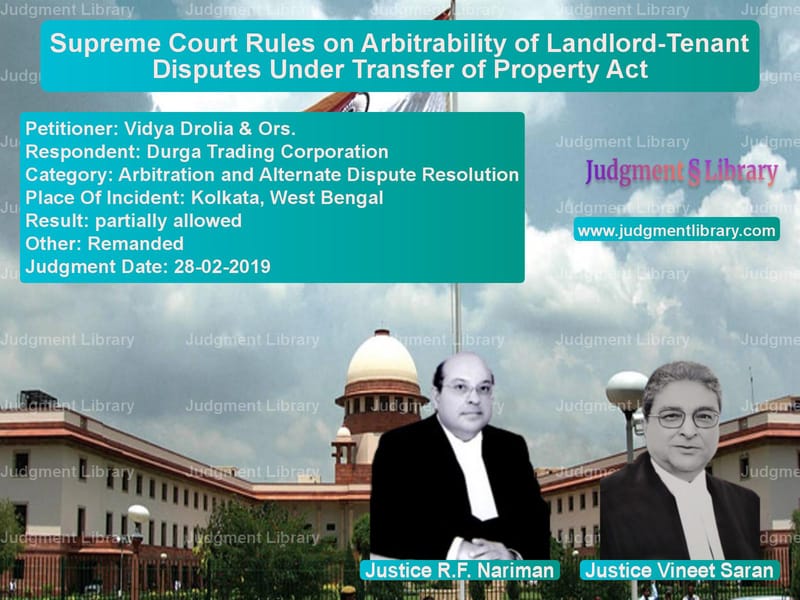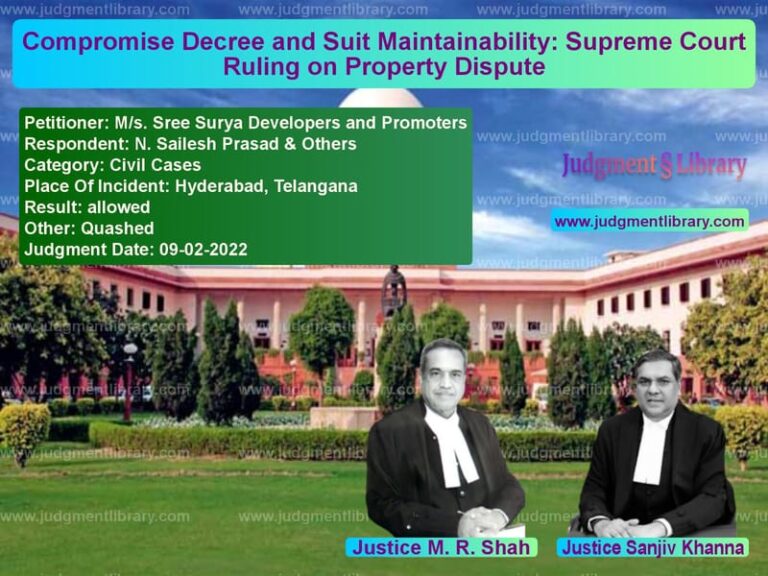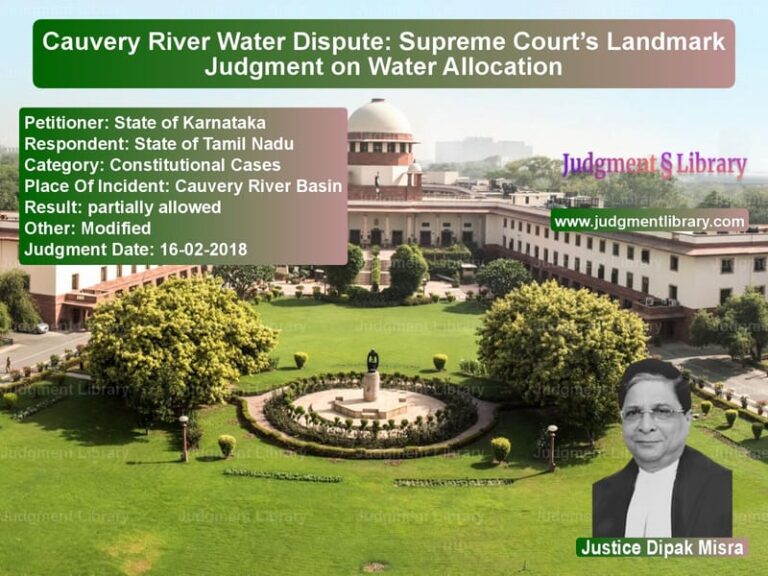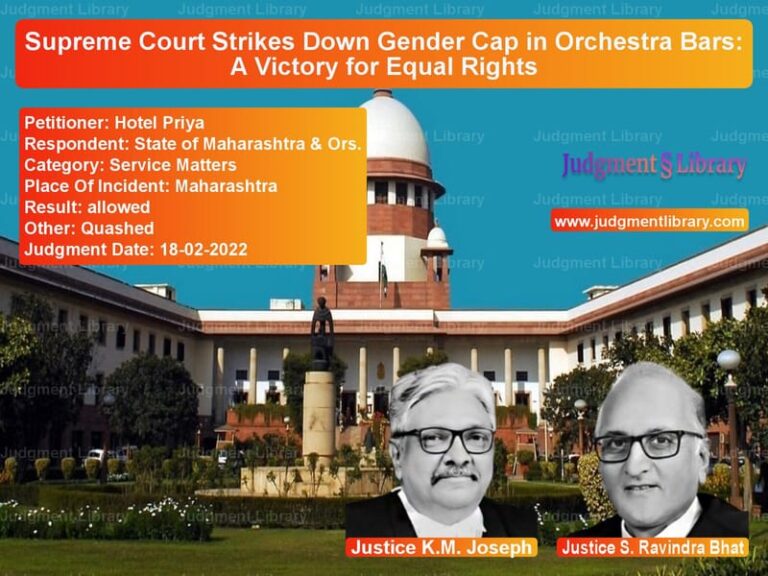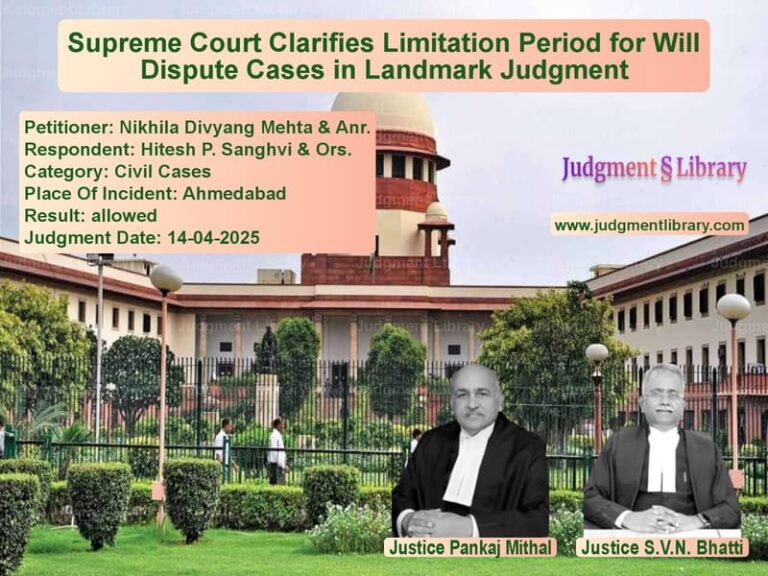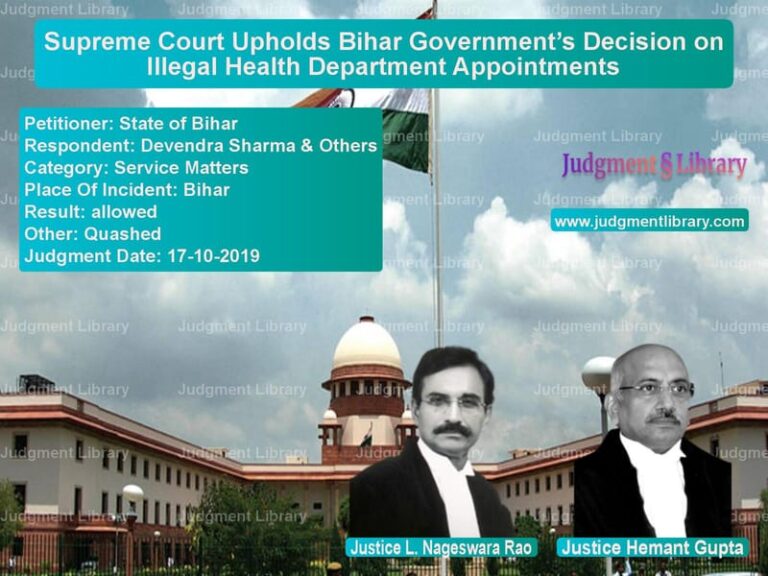Supreme Court Rules on Arbitrability of Landlord-Tenant Disputes Under Transfer of Property Act
The case of Vidya Drolia & Ors. vs. Durga Trading Corporation is a landmark judgment where the Supreme Court addressed the arbitrability of landlord-tenant disputes under the Transfer of Property Act, 1882. The Court had to decide whether disputes regarding lease termination and eviction could be referred to arbitration under the Arbitration and Conciliation Act, 1996, or whether such matters fell within the exclusive jurisdiction of civil courts.
Background of the Case
The dispute arose from a tenancy agreement executed on February 2, 2006, between the predecessor-in-title of the landlord (Shree Bajrang Land & Trading Company) and the tenant, Vidya Drolia & Ors., concerning certain godowns and other structures.
The agreement specified:
- The lease period was 10 years, with an initial period of 5 years and an option for renewal for another 5 years with a 10% rent increase.
- The monthly rent was INR 12,985.
- The tenant was obligated to vacate the premises upon expiry of the lease.
- Clause 23 contained an arbitration clause for disputes arising from the agreement.
On October 16, 2012, the ownership of the premises was transferred to Durga Trading Corporation, and the tenant began paying rent to the new landlord. The new landlord sought eviction after the expiry of the 10-year lease, which ended on February 1, 2016. The tenant refused to vacate, prompting the landlord to invoke arbitration on February 29, 2016.
Key Legal Issues
The case raised the following legal questions:
- Whether disputes related to lease termination under the Transfer of Property Act can be resolved through arbitration.
- Whether public policy considerations exclude arbitration in landlord-tenant disputes.
- Whether the Calcutta High Court was justified in appointing an arbitrator under Section 11 of the Arbitration and Conciliation Act, 1996.
- Whether previous Supreme Court rulings, including Himangni Enterprises v. Kamaljeet Singh Ahluwalia, precluded arbitration in landlord-tenant disputes.
Petitioner’s Arguments
The tenant, represented by Debajyoti Basu, argued:
- The Transfer of Property Act governs landlord-tenant disputes, and such disputes create rights in rem (against the world) rather than in personam (between private parties), making them non-arbitrable.
- Public policy considerations under Sections 111(g), 114, and 114A of the Transfer of Property Act exclude arbitration.
- Granting mesne profits (damages for wrongful occupation) falls outside the scope of arbitration, as such damages are determined under Order XX Rule 12 of the Civil Procedure Code (CPC).
- The Supreme Court’s ruling in Himangni Enterprises (2017) precluded arbitration in tenancy matters under the Transfer of Property Act.
Respondent’s Arguments
The landlord, represented by Saurav Agarwal, countered:
- The tenant actively participated in arbitration proceedings for 18 sittings, showing implied consent to arbitration.
- The Himangni Enterprises ruling applied only to statutory tenancies, not to leases under the Transfer of Property Act.
- The Transfer of Property Act does not explicitly bar arbitration.
- Landlord-tenant disputes do not involve public rights or third-party claims, making them arbitrable.
Supreme Court’s Observations
The Supreme Court, led by Justice R.F. Nariman and Justice Vineet Saran, analyzed the nature of landlord-tenant disputes and their arbitrability. The Court made the following key observations:
“Where the Transfer of Property Act applies between landlord and tenant, disputes between the said parties would not be arbitrable. However, the present case does not involve a statutory tenancy but a private contractual lease.”
The Court examined Section 11(6A) of the Arbitration and Conciliation Act, which limits judicial interference in arbitration agreements. It also analyzed previous rulings, including Booz Allen & Hamilton v. SBI Home Finance, which held that eviction matters under rent control laws are non-arbitrable but did not extend the same restriction to contractual leases.
The Court noted:
- Sections 111(g), 114, and 114A of the Transfer of Property Act provide relief to tenants, but do not expressly bar arbitration.
- Landlord-tenant disputes involve private rights (in personam), making them suitable for arbitration.
- The Himangni Enterprises ruling required reconsideration by a larger bench.
Final Judgment
The Supreme Court ruled:
- The arbitration clause in the tenancy agreement was valid.
- Landlord-tenant disputes arising from contractual leases are arbitrable.
- The Himangni Enterprises ruling requires reconsideration by a larger bench.
- The stay on arbitration proceedings was lifted, allowing the arbitrator to proceed.
- The final arbitral award cannot be executed without Supreme Court approval.
Conclusion
This ruling marks a significant shift in Indian arbitration law by affirming that contractual landlord-tenant disputes can be referred to arbitration. The decision provides clarity on arbitrability under the Transfer of Property Act and limits judicial intervention in arbitration agreements. By referring the Himangni Enterprises ruling to a larger bench, the Court has paved the way for further developments in landlord-tenant law and arbitration jurisprudence in India.
Petitioner Name: Vidya Drolia & Ors..Respondent Name: Durga Trading Corporation.Judgment By: Justice R.F. Nariman, Justice Vineet Saran.Place Of Incident: Kolkata, West Bengal.Judgment Date: 28-02-2019.
Don’t miss out on the full details! Download the complete judgment in PDF format below and gain valuable insights instantly!
Download Judgment: Vidya Drolia & Ors. vs Durga Trading Corpor Supreme Court of India Judgment Dated 28-02-2019.pdf
Direct Downlaod Judgment: Direct downlaod this Judgment
See all petitions in Arbitration Act
See all petitions in Dispute Resolution Mechanisms
See all petitions in Commercial Arbitration
See all petitions in Judgment by Rohinton Fali Nariman
See all petitions in Judgment by Vineet Saran
See all petitions in partially allowed
See all petitions in Remanded
See all petitions in supreme court of India judgments February 2019
See all petitions in 2019 judgments
See all posts in Arbitration and Alternate Dispute Resolution Category
See all allowed petitions in Arbitration and Alternate Dispute Resolution Category
See all Dismissed petitions in Arbitration and Alternate Dispute Resolution Category
See all partially allowed petitions in Arbitration and Alternate Dispute Resolution Category

